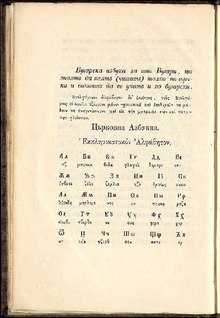Parteniy Zografski
[9] Zografski was born as Pavel Hadzhivasilkov Trizlovski (Павел Хадживасилков Тризловски) in Galičnik,[10][11] Ottoman Empire, in present-day North Macedonia.
Born into the family of a rich pastoralist, young Pavel had the opportunity to attend various primary and secondary schools.
He started his education in the Saint Jovan Bigorski Monastery near his native village, then he moved to Ohrid in 1836, where he was taught by Dimitar Miladinov.
Zografski continued his education at the seminary in Odessa, Russian Empire; he then joined the Căpriana monastery in Moldavia.
After a short stay in Paris (1850), he returned to serve as a priest at the Russian church in Istanbul until he established a clerical school at the Zograf Monastery in 1851 and taught there until 1852.
[13] On 29 October 1859, at the request of the Municipality of Kukush (Kilkis), the Patriarchate appointed Zografski Metropolitan of Dojran in order to counter the rise of the Eastern Catholic Macedonian Apostolic Vicariate of the Bulgarians.
Between 1868 and 1869, Bishop Partheniy became active in the region of Plovdiv, where he began to ordain priests for the Bulgarian Church, which had already separated from the Patriarchate, but had not yet been confirmed.
"[24][25][26] However, in the year that Zografski died (1876), Drinov visited his birthplace and studied the local Galičnik dialect, which he regarded as part of the Bulgarian diasystem, publishing afterwards the folk songs collected there.
In fact Bulgarian was standardized later on the basis of the eastеrly from the yat border located Central Balkan dialect, because of the then belief that in the Tarnovo region, around the last medieval capital of Bulgaria, the language was preserved allegedly in its purest form.



